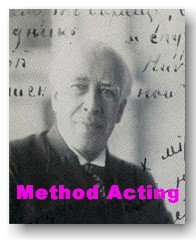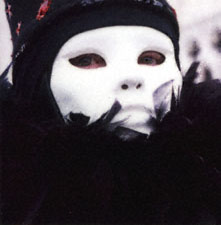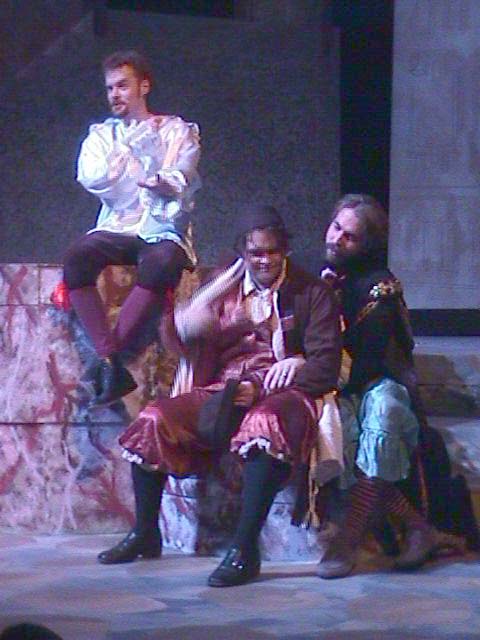[ advertising space : webmaster ]
text LINKS
Shake script analysis
my calendar
vtheatre.net
act.vtheatre.net
direct.vtheatre.net
film.vtheatre.net
script.vtheatre.net
shows.vtheatre.net
web.vtheatre.net
method.vtheatre.net

Theory of Spectatorship
webmaster
Key Terms: Glossary

GeoAlaska: Theatre & Film

theatre books
Mailing List & News -- subscribe yourself *


Method for Directors?

ShowCases: 3 Sisters, Mikado, 12th Night, Hamlet, The Importance of Being Earnest, Dangerous Liaisons, Don Juan: Director's BOOK

my eGroups
Playscript Analysis: Fall'99 and After


SHOWS: 12th Night
Bedford: "A Midsummer Night's Dream"
Summary
Shakespeare @ Amazon
meyerhord.us

Questions
Drama : Take 1st QuizNotes
Shrew 04: situation -- the compability test. They are in love, but what a start! She wants out of the father's house, he planned to marry for money. Comedy of characters? Kate is gentle with mask of a shrew. Pete is a gentleman, playing brute.
Comedies: As You Like It * The Taming of the Shrew * The Tempest * A Midsummer Night's Dream * The Merchant of Venice
[ This is the BBC series marketed by Ambrose Video that many colleges and libraries have purchased (see ambrosevideo.com). ]
...
All's Well That Ends Well * As You Like It * The Comedy of Errors * Cymbeline * Love's Labours Lost * The Merry Wives of Windsor * The Merchant of Venice * A Midsummer Night's Dream * Much Ado About Nothing * Pericles, Prince of Tyre * Taming of the Shrew * The Tempest * Troilus and Cressida * Twelth Night * Two Gentlemen of Verona * Winter's Tale * Measure for Measure *
"Many times the question is asked: what makes a play a comedy instead of a tragedy? Comedies treat subjects lightly, meaning they don't treat seriously such things as love. Shakespeare's comedies often use puns, metaphors, and insults to provoke "thoughtful laughter." The action is often strained by artificiality, especially elaborate and contrived endings. Disguises and mistaken identities are often very common." *
I use a couple references to Aristotle (Poetics, see 200X files):
Comic Hero: below everage *
+ happy end *
Readings: Robert G. Hunter, Shakespeare and the Comedy of Forgiveness (1965); Arthur Kirsch, Shakespeare and the Experience of Love (1981); Alexander Leggatt, Shakespeare's Comedy of Love (1974, reprinted 1990); W. Thomas MacCary, Friends and Lovers: The Phenomenology of Desire in Shakespearean Comedy (1985); and Leo Salingar, Shakespeare and the Traditions of Comedy (1974).
DVD * Shakespeare Comedies 2003
Britain’s most distinguished actors, including Helen Mirren, John Cleese and Nigel Davenport bring The Comedies of William Shakespeare to live, including the sunny As You Like It, the comic battle of the sexes played out in The Taming of the Shrew, the enchanting romance of The Tempest and more. DVD Only. 11 hours WSD3475 * Country of Production: United Kingdom
Shake Comedies on the Web (100 top)
12th Night online from Google * readbookonline.net
Twelfth Night (1996) DVD: B0009VNBKG
Four centuries of The Taming of the Shrew
"What to make of a play that for four hundred years has been wildly popular with audiences, has for half of that time appeared in various incarnations and disguises, and flies in the face of modem ideas about men, women, and marriage? Whether farce or protoferninist critique, moral tale of wifely duties or brutal burlesque of marriage and the married, The Taming of the Shrew stands as one of Shakespeare's most often performed and best loved comedies." *:
... Like much of Shakespeare, The Taming of the Shrew fell victim to the Restoration propensity for editing and reconstructing Elizabethan and Jacobean dramas. For almost two hundred years the play was seen not in its original form, but in adaptations, including Charles Johnson's The Cobbler of Preston and James Wardale's The Cure for a Scold. Pepys most likely saw John Lacy's risqu6 version titled Sauny the Scott, in which the action is moved from Padua to England, and Petruchio's comic servant, renamed Sauny, is the lead character.
In 1754 actor-manager David Garrick presented his own version, Catherine and Petruchio, which supplanted all other adaptations and became the prevailing form in which the play would be seen well into the nineteenth century. Garrick's play was a short, farcical, three-act rendition which omitted the Induction (in whid the drunken tinker, Christopher Sly, is tricked into believing he is a lord and is presented The Taming of the Shrew as entertainment) as well as the Bianco/Lucentio subplot. Katherina becomes Catherin and the story is condensed into four scenes-the courting, the wedding, the banquet, and the Tailor's visit Catherine was stronger and more direct than her predecessor; her final speech was truncated and she was given lines which suggest that she was doing some taming of her own. This stripped down, slapstick Shrew became a frequent afterpiece in the multi-faceted theatrical evenings of the day. Kerable, Macready, Irving, Siddons, and Terry are a few of the stars who appeared in Catherine and Petruchio in England and America, where it often followed Romeo and Juliet on the bill.
Garrick's emphasis on farce was the beginning of a trend: stage business became increasingly elaborate, the servant's lazzi (stock gags and tricks) more prominent, and the entire proceedings more violent. A whip was introduced as one of Petruchio's standard props, a performance tradition that continues today. Through it all, however, Petruchio remained pretty much a well-dressed, eighteenth-century gentleman.
... Hollywood loved The Taming of the Shrew, making it the subject of at least four silent movies. When Hollywood went talkie, so did Shrew. The first Shakespeare sound film in 1929 featured Douglas Fairbanks and Mary Pickford as the quarrelsome twosome in a screwball comedy version-38 years before that other famous husband and wife team, Burton and Taylor, appeared in Franco Zeffirellis lusty, technicolor whirlwind. Pickford's final moment-anticipating Taylor's overly earnest delivery of the fifth act speech-was a wink to the assembled gentlewomen, and to the audience, entreating them not to worry, that everything is under control.
Recent productions continue to reveal a wide range of approaches and interpretations. Michael Bogdonov's 1978 Shrew at the RSC was a decidedly feminist staging. The Induction began in the audience, as an argument between an unruly audience member, who turned out to be Christopher Sly, and an usherette. The comedy played out as a revenge fantasy of the misogynist Sly, played by Jonathan Pryce, who also appeared as Petruchio. Set in modern dress, complete with motorbikes and Mafiosi, Bogdonov's interpretation exposed an ironic and disturbing edge underneath the farce. In contrast, director Jonathan Miller felt that Shakespeare's comedy must be looked at "on its own terms" and created a piece which "enthusiastically recognizes Tudor social ideas of the function of women in the household without agreeing with them." And in Central Park just five years ago, Tracey Ullman and Morgan Freeman fought it out cis more or less equals in a Wild West version directed by A. J. Antoon. [ The Shakespeare Theatre, Christopher Baker, Dramaturg ]
... lul-blog
















